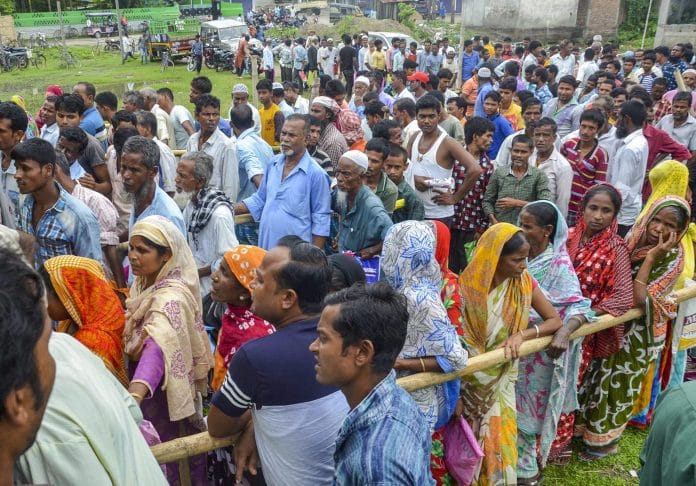NRC will help integrate the Assamese Muslims but the exercise is a scary and dangerous prospect, they tell ThePrint.
New Delhi: The contentious complete draft of the National Register of Citizens (NRC), released in Guwahati Monday, has left 40 lakh people in Assam, who are not on the list, at the risk of losing their citizenship.
While those excluded have been promised remedial legal measures, uncertainty continues to dog the exercise, with critics panning it as a futile polarising one.
It has also sharply divided opinion in the state, where identity roles have shaped politics for close to five decades. ThePrint spoke to a few Assamese students and young professionals living in Delhi for their views on the NRC and whether or not they relate to the many sentiments playing out back home.
‘If conducted properly, NRC could integrate communities’
Jyotirmoy Talukdar, Freelance writer
Talukdar, a freelance writer in Delhi, says he’s in favour of the NRC as he believes it will finally help with the “integration” of Assamese Muslims. “As someone from the indigenous population of Assam, I am aware of the pejorative slurs many Bangla-speaking Assamese Muslims are subjected to. They speak a variant of Bangla but are very much Assamese. They are discriminated against for the language and are labelled as ‘Bangladeshis’,” says Talukdar, originally from Barpeta district in Assam but who has been in Delhi since 2012.
“The NRC exercise, if conducted properly and honestly, could lead to the integration of many of these Assamese. It could lead to a certain legitimisation of their Assamese identity and put an end to their suffering of being labelled as the ‘other’,” he says.
Talukdar, however, wonders if the exercise is logistically viable.
“The poor Assamese population is bound to suffer. They might not have a lot of the required documents because of a lack of access to resources. What if their names were spelt wrong in the 1951 census? What then? These questions need to be paid heed to,” he says.
‘NRC exercise rooted in exclusivist ethnic nationalism’
Angshuman Choudhury, Policy Analyst
Angshuman’s mother didn’t find her name on the NRC list published Monday. He is not sure if this is because of her Bengali heritage, or simply because of an error in the procedure.
“I don’t have consistent evidence to conclude that her name not being mentioned in the list is because of her Bengali origin, as plenty of my native Assamese friends haven’t found their name on the list either,” he says.
A policy analyst at the Institute of Peace and Conflict Studies in Delhi, Angshuman is of mixed parentage — his father is Assamese while his mother is Bengali, both born in Assam. He grew up in the small town of Bongaigaon in lower Assam, before moving to Delhi when he was in Class 11.
While he hopes his mother will find her name on the list after the remedial measures, he’s concerned that the NRC exercise could potentially fuel ethnic tensions in the state.
“There is major xenophobia across Assam. This exercise, although legal, could lead to far-reaching consequences of a negative kind. A certain nationalist-ethnic collective conscience of the Assamese people, which is inherently exclusivist in nature, is being used as a tool to target certain communities,” he says. “The latent Islamophobic sentiment behind this exercise cannot be denied. The flow of people across borders is very normal. Detention centres do not belong in a democracy, they are undemocratic.”
Also read: Process, purpose and politics: All you want to know about Assam’s NRC
‘Muslim but support the NRC’
A 26-year-old Mphil student at JNU
An Assamese Muslim from Tezpur, he is in favour of the NRC as he too believes that it could lead to better integration of the communities in the state. “If it is conducted in a free and fair manner, then this could mean closure to a lot of people who have been historically discriminated — be it because of their language or their religion. Particularly Bangla-speaking Assamese Muslims who have suffered because of a certain bias,” says the M.Phil student of JNU.
But is he worried that the exercise could lead to further persecution rather than integration? “There is definitely a possibility of manipulation from both sides. People with lesser resources may not know how to go about producing such documents. The NRC will only be a success if it is done honestly,” he adds.
‘Understand both sides of the argument’
A 22-year-old student who shifted to Delhi last year.
The student from Tezpur in Assam says she’s experienced the effects of migration but is conflicted on the NRC issue.
“I understand people’s anger and where it may emerge from. When I was a child, I remember passing through the area around the Kaziranga National Park. But today, there are a number of huts on that land, almost like people have encroached on it. This is the one example of migration playing out in front of me,” says the student who moved to Delhi last year.
Despite this, she isn’t strongly in favour of the NRC. “I can also empathise with the immigrants. There is a reason why people migrate and we can’t discount that either. More importantly, even if the NRC is able to identify ‘illegal immigrants’, how will it handle them after the process? This is a scary and very dangerous prospect,” she adds.
Also read: Will NRC draft list in Assam send people into an indefinite limbo or do they have legal safeguards?






